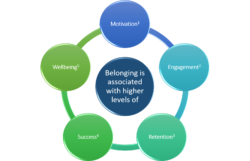Belonging matters
Why does belonging matter?
In recent years, there has been a growing body of research and literature that discusses the role of feelings of belonging in students’ life at university.
Clear links have been made between feelings of belonging and motivation to learn and engage with studies.If students are more motivated and engaged, universities will do better at retaining students and those students have better chances of completing their course successfully. Perhaps most importantly, clear links have been made between feelings of belonging and wellbeing.

Belonging has been associated with higher levels of:
- academic motivation (Suhlmann et al, 2018)
- engagement (Gopalan & Brady, 2019)
- retention (Hausmann et al, 2007; Suhlmann et al, 2018)
- success (NASEM, 2017)
- wellbeing (Suhlmann et al, 2018; Gopalan & Brady, 2019; Baumeister & Leary, 1995)
It is important, therefore, that we understand what can contribute to student feelings of belonging and what things can make our students feel like they don’t belong. We will look at what some students have said about this in the next section.
What can influence students' sense of belonging?
What we know from the literature is that when students feel that they belong, that they are seen, respected and valued, they can thrive. However, we need to bear in mind that belonging is an intensely personal experience and that it can mean different things to different people at different stages in their university experience.
Colleagues at the university have collected students’ views on when they have experienced feelings of belonging and when they have not. Click on each theme below to read what students said.
Students who felt a sense of belonging and connectedness at the University said:
Pedagogical practices
Whenever I work in a small group of people, or attended lectures/seminars in a small group, I always feel like I belong to the group/community. Not so much in very large groups
Representation
Seeing that the university accommodates for people of various faiths i.e. Islamic prayer room
Staff-student relationships
Times I express concerns to a lecturer and they help as much as possible in a friendly manner
Academic personal tutoring
When talking to a personal tutor
Peer-peer relationships
Before a lecture or when socializing outside university with classmates when they talk about what they are struggling with
Space
There is a real community feeling about being a postgrad/doctoral student. There are dedicated areas for postgrads to meet and convene and it is nice to meet others in these communal spaces
When working in the foyer of my school, where I have been able to engage in small talk with tutors who remember me and want to have a chat…
Co/Extra-curricular activities
At ‘The Breakfast Club’ in my department
From the examples above, we can see that students' feelings of belonging are linked (but not limited) to a wide range of factors which include space/place, interactions in small groups in classes, talking to tutors, organised activities and being able to express concerns and being responded to with kindness. What this range of responses indicates is that feelings of belonging are individual and diverse, linking to many different areas of university life. You can learn more about how different areas of our work intersect to support students in feeling seen, respected and valued on our 'Developing belonging' section.
Students who felt low levels of belonging at the University said:
Hidden curriculum/Imposter syndrome
I don’t feel like I belong on my course at all. I feel like I am stupid because I rarely understand what is going on … I don’t understand anything but everyone else does
Representation
I am a mature student with children and have felt very out of place at times. I’d like to participate in activities, but have found some of them to be very awkward and geared more toward the ‘traditional’ students. Socialising as a parent can be difficult
I am the only …Muslim … student in my whole year … I feel isolated and alone all the time. I still haven’t made any friends in my classes and I’m very lonely
Pedagogical practices
I have had the experience where I literally understood nothing due to the fast-paced nature of teaching but also some very positive experience with patient and clear teaching
The class sizes are so big there’s no sense of community
Decolonising
I have had the first-hand experience of not seeing myself reflected in the curriculum...It has meant that academic work has appeared inaccessible to me
From the comments above, we can see that students may feel less of a sense of belonging when they perceive themselves to know less than others (Imposter syndrome), feel under-represented on campus, are learning in large cohorts, do not see themselves in the curriculum, experience social activities as exclusionary, and because of the manner in which they are taught. Discover in our 'Developing belonging' section ways in which we can support students in developing a sense of belonging.
